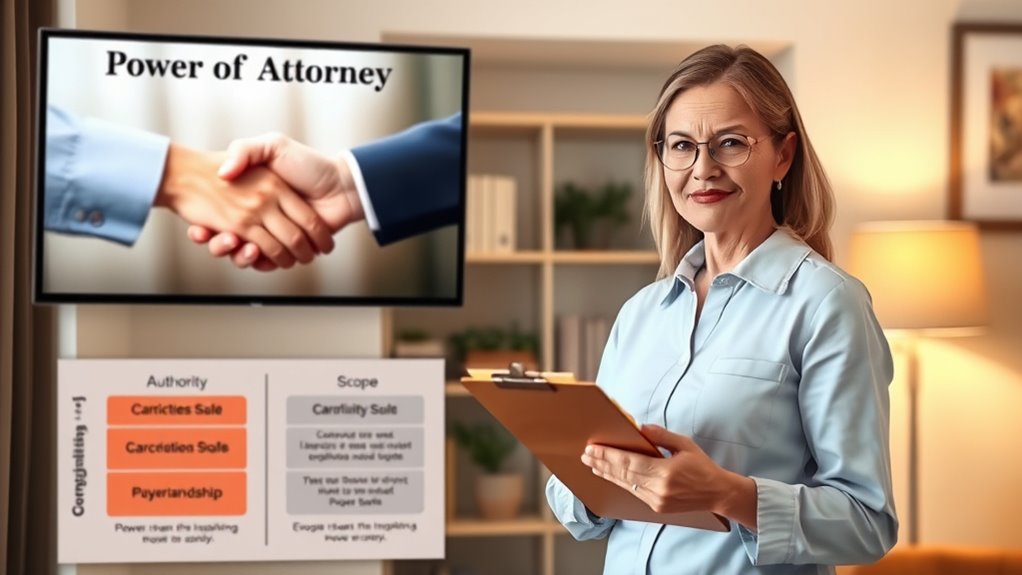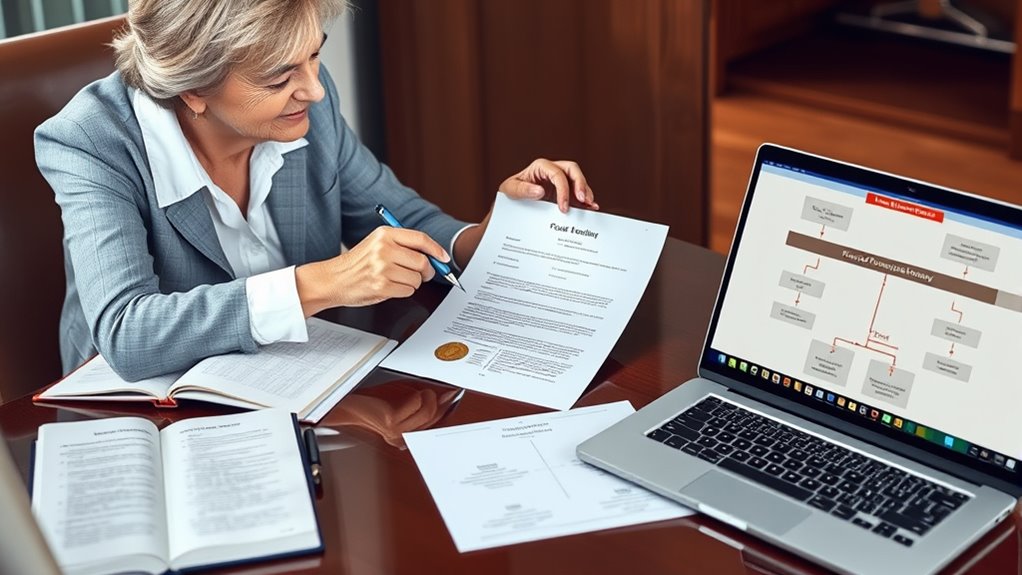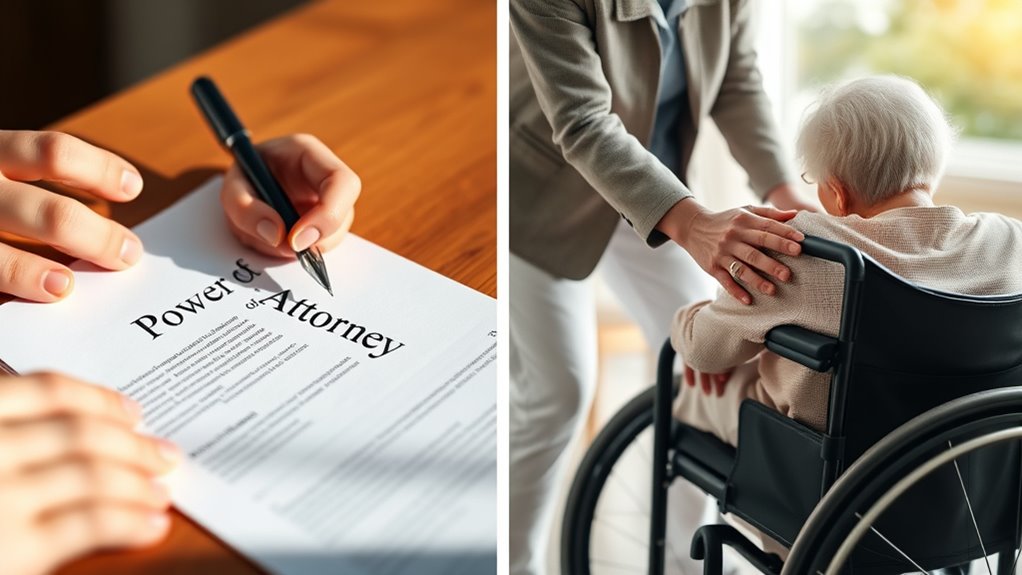Understanding the difference between power of attorney and guardianship helps you protect your loved one’s wellbeing and assets effectively. A power of attorney lets you handle specific financial or health decisions while the person is still capable, and it’s simpler to set up. Guardianship, however,, court-appointed, grants broad control when someone can no longer make their own choices. Knowing when each is appropriate and how to establish them is essential—more insights are just ahead.
Key Takeaways
- Power of attorney is a legal document granting specific authority, while guardianship is court-appointed and involves broader, ongoing control.
- POA is created voluntarily, can be revoked, and typically involves less court involvement than guardianship.
- Guardianship provides comprehensive decision-making authority for incapacitated individuals, lasting until legally terminated.
- Proper legal procedures, including notarization and court approval, are essential for both POA and guardianship validity.
- Guardianship is necessary when a person cannot manage their affairs due to age, illness, or disability, after proper capacity assessment.
Defining Power of Attorney and Guardianship

What exactly is the difference between a power of attorney and guardianship? A power of attorney is a legal document you create, allowing someone you trust to handle your financial or healthcare decisions if you’re unable to do so. You retain control and can specify exactly what powers they have. Guardianship, on the other hand, is a court-appointed relationship where a judge designates someone to care for a minor or an incapacitated adult. In guardianship, the court assumes control over the person’s personal or financial affairs, especially if they can’t make decisions for themselves. While power of attorney is flexible and can be revoked, guardianship involves court approval and ongoing oversight. Both are legal tools designed to protect individuals who can’t fully care for themselves. Additionally, contrast between these legal options highlights the different levels of court involvement and authority granted in each arrangement.
Key Differences in Authority and Scope

Understanding the key differences in authority and scope between power of attorney and guardianship helps clarify how each legal tool functions. With a power of attorney, you grant someone authority to handle specific financial or healthcare decisions on your behalf, but that authority is limited to what you specify and can be revoked anytime you choose. Guardianship, on the other hand, gives a court-appointed guardian broad control over an individual’s personal and financial affairs, often when they’re unable to make decisions themselves. Guardianship typically involves a formal legal process, and the guardian’s authority can extend until the court terminates it. While power of attorney is flexible and limited by your instructions, guardianship provides a much broader scope of control, often for someone unable to manage their own affairs.
Typical Situations for Using Power of Attorney

You might use a power of attorney to handle your financial affairs when you’re traveling or unable to manage them yourself. It’s also useful for making healthcare decisions if you become incapacitated. Additionally, a power of attorney can give someone legal authority to manage your important documents when needed.
Managing Financial Affairs
Managing financial affairs often requires a trusted person to act on someone’s behalf, especially during times when they cannot handle their own finances. A power of attorney allows you to make financial decisions, pay bills, manage investments, and handle taxes for the person. This arrangement is flexible and can be limited or broad, depending on needs.
| Benefit of Power of Attorney | When to Use It |
|---|---|
| Maintains financial control | When the individual is temporarily unable to manage finances |
| Avoids court guardianship | For ongoing, trusted financial management |
| Flexibility in authority | When immediate financial decisions are needed |
| Cost-effective | To prevent legal expenses and delays |
Healthcare Decision-Making
Healthcare decision-making through a power of attorney becomes essential when you or someone else can’t communicate their wishes because of illness, injury, or cognitive decline. In these situations, having a designated agent allows for quick, informed decisions about treatments, medications, or care plans. For example, if someone is unconscious after an accident, their agent can authorize necessary procedures or surgeries. Similarly, if a person develops dementia and can no longer make choices, a healthcare power of attorney guarantees their preferences are respected. This legal document provides peace of mind, knowing that a trusted individual will step in when communication isn’t possible. It helps prevent delays, confusion, or conflicts during medical emergencies, ensuring that the person’s healthcare aligns with their values and wishes.
Handling Legal Documents
Handling legal documents often becomes necessary when individuals are unable to manage their own affairs due to illness, injury, or cognitive decline. When this happens, a power of attorney allows you to step in and handle essential paperwork, such as banking, property, or insurance matters. This document grants you authority to sign contracts, pay bills, and manage financial transactions on their behalf. Using a power of attorney is especially helpful during temporary periods of incapacity or when managing ongoing affairs. It’s a practical way to ensure that your loved one’s financial and legal interests are protected without the need for court intervention. By preparing these documents in advance, you help avoid delays and complications during difficult times.
When Guardianship Becomes Necessary

Guardianship becomes necessary when an individual is unable to make decisions or care for themselves due to age, illness, or disability. You might need guardianship if the person can’t manage their finances, health care, or daily activities. This situation often arises with severe cognitive decline, mental health issues, or physical incapacitation. When no other arrangements, like a power of attorney, are in place, the court may step in to appoint a guardian. This legal authority gives you the power to make important decisions for the person’s well-being. Guardianship is a serious responsibility and is typically considered a last resort when less restrictive options aren’t sufficient. You’ll need to demonstrate that the individual genuinely cannot care for themselves or handle their affairs. Additionally, understanding the horsepower of electric dirt bikes can be relevant for caregivers overseeing mobility devices or adaptive transportation options for individuals with disabilities. Proper assessment of the individual’s capacity is crucial before pursuing guardianship to ensure that the intervention is necessary and appropriate. Conducting thorough evaluations can help determine whether less restrictive alternatives might better serve the person’s needs and preserve their independence whenever possible. Furthermore, considering educational toys like Montessori toys can be beneficial in supporting cognitive and sensory development for individuals with certain disabilities, helping to maintain their skills and promote engagement.
The Process of Establishing a Power of Attorney

To establish a power of attorney, you first need to choose the right person to act on your behalf. Next, you’ll draft the legal document and guarantee it clearly outlines their authority. Finally, you must have the document notarized and witnessed to make it official.
Selecting the Right Agent
Choosing the right agent is a critical step when establishing a power of attorney, as this person will have the authority to make important decisions on your behalf. You need someone you trust implicitly, who understands your values and preferences. Consider their ability to handle complex situations calmly and responsibly. It’s important to select someone who can communicate well with healthcare providers, financial institutions, and family members. Discuss your expectations clearly with your chosen agent to guarantee they’re comfortable and willing to take on this responsibility. Avoid choosing someone impulsive, overwhelmed, or unlikely to respect your wishes. Remember, this person will act in your best interest, so selecting someone who is dependable, honest, and understands your needs is essential for a smooth and effective power of attorney process.
Drafting the Legal Document
Once you’ve selected a trustworthy agent, the next step is to draft the legal document that officially grants them authority. This document, usually called a Power of Attorney, must include specific details to be valid. You’ll need to clearly identify yourself, your agent, and outline the powers being granted. Make sure to use precise language to avoid ambiguity. The document should also specify the effective date and duration of authority. Review state laws to ensure compliance. Once drafted, you’ll submit the document for notarization and witnessing (discussed later). Below is a visual overview of key elements to include:
| Element | Description | Importance |
|---|---|---|
| Principal’s Name | Your full legal name | Identifies who grants authority |
| Agent’s Name | The trusted person’s full name | Who will act on your behalf |
| Powers Granted | Specific tasks or decision rights | Defines scope of authority |
| Effective Date | When the power begins | Ensures timely activation |
Notarization and Witnessing
Have you wondered how to make your Power of Attorney legally binding? The process typically requires notarization and witnesses. First, sign the document in front of a notary public, who verifies your identity and witnesses your signature. The notary then affixes a seal, confirming the document’s authenticity. In addition, many states require one or more witnesses to observe you signing the document. Witnesses must be disinterested parties—people who aren’t named as agents or beneficiaries. Their signatures also affirm that you signed voluntarily and understood the document’s contents. Ensuring proper notarization and witnessing is essential; it helps prevent challenges to your Power of Attorney later. Follow your state’s specific rules to guarantee your document is legally valid and enforceable.
Steps to Obtain Guardianship and Legal Requirements

To begin the process of obtaining guardianship, you must first file a petition with the appropriate court, providing detailed information about the individual who needs assistance and your relationship to them. After filing, you’ll need to gather supporting documents such as medical records and proof of your relationship. The court will then review your petition and may require a formal evaluation of the person’s capacity.
The next steps include:
- Attending a court hearing where your case will be evaluated.
- Providing notice to the individual and interested parties.
- Obtaining a court order appointing you as guardian if all requirements are met.
Legal requirements vary by jurisdiction, so check local laws to guarantee compliance throughout the process.
Responsibilities and Limitations of Each Role

Power of attorney and guardianship roles come with distinct responsibilities and limitations that you need to understand clearly. As a power of attorney, your authority is limited to the scope outlined in the document, and it ends if the principal becomes incapacitated or revokes it. Guardianship, however, grants broader control over personal and financial decisions and continues until the court terminates it. Additionally, understanding the Gold IRA Rollovers process can be beneficial when planning for long-term financial security in the context of estate planning and asset management. Being aware of proper training and socialization strategies for dogs can also be helpful when managing a pet’s behavioral development in guardianship situations.
How to Choose the Right Legal Arrangement for Your Loved One

Choosing the right legal arrangement for your loved one depends on their specific needs, level of independence, and the extent of decision-making support required. To determine the best fit, consider these key factors:
- Their ability to handle financial and medical decisions without assistance.
- The level of supervision they need to ensure safety and well-being.
- The complexity of their financial or healthcare situation.
- Security vulnerabilities in payment systems that could impact their financial safety and privacy. Implementing protective measures like identity protection can help safeguard their assets and personal information.
If your loved one can manage some decisions but needs help with major ones, a power of attorney may suffice. For those who cannot make decisions at all, guardianship provides holistic control. Assess their decision-making capacity as a critical factor, and consider how emotional support can play a role during this decision process to ensure their well-being.
Protecting the Rights and Wellbeing of Vulnerable Individuals

When selecting the appropriate legal arrangement for your loved one, safeguarding their rights and wellbeing must always come first. You need to guarantee they’re protected from abuse, neglect, or exploitation, regardless of their vulnerability. You also should be aware of common narcissistic behaviors that could pose risks to their safety and emotional health. Stay informed about their legal rights and advocate for their interests in all decisions. Regularly monitor their situation and communicate openly with professionals involved in their care. It’s essential to involve your loved one in decisions whenever possible, respecting their preferences and dignity. Establish clear legal boundaries and safeguards to prevent misuse of authority. By actively championing their rights, you help maintain their independence, dignity, and quality of life. Additionally, understanding the distinctions like power of attorney vs. guardianship can be crucial in choosing the right legal protections. Familiarizing yourself with legal protections can empower you to make more informed decisions on their behalf. Being familiar with the benefits of positive thinking can also help caregivers maintain resilience and a proactive mindset in challenging situations. Recognizing the importance of nutritional safety ensures that caregivers are aware of potential hazards, such as toxic foods, and how to prevent accidental harm. Ultimately, your vigilance and compassion are key to ensuring their wellbeing is prioritized and protected at all times.
Frequently Asked Questions
Can a Power of Attorney Be Revoked or Changed Easily?
You might wonder if you can easily revoke or change a power of attorney. Generally, yes, you can revoke it at any time as long as you’re mentally competent. To do so, you should create a written statement, notify all relevant parties, and sometimes fill out specific forms. Keep in mind, the process varies by state, so it’s wise to verify local laws or consult a legal professional to ensure everything’s done correctly.
How Does Guardianship Impact the Individual’s Day-To-Day Independence?
Imagine a gentle guiding hand shaping someone’s daily life. Guardianship can subtly influence your loved one’s independence, as it grants you authority over decisions they’d usually make alone. While this can offer protection, it might also feel like a delicate balance between support and overreach. You’ll need to navigate carefully, ensuring they retain as much autonomy as possible while still providing necessary guidance and care.
Are There Costs Associated With Establishing a Power of Attorney or Guardianship?
You’ll find that both establishing a power of attorney and guardianship can involve costs. Typically, creating a power of attorney is more affordable, often just a filing fee and possibly legal assistance. Guardianship usually costs more due to court proceedings, legal fees, and ongoing expenses. Be prepared for these costs and consider consulting a legal professional to understand the specific fees in your area.
What Are the Legal Consequences of Misusing These Arrangements?
If you misuse a power of attorney or guardianship, you could face serious legal consequences, including fines, removal from your role, or even criminal charges. You’re responsible for acting in the best interests of the person you’re caring for, and any abuse or neglect can lead to legal action. Always follow the law and act ethically to avoid damaging consequences for yourself and the individual under your care.
How Do These Roles Affect an Individual’s Privacy and Personal Rights?
Ever wonder how your actions impact someone’s privacy and rights? When you assume a role like power of attorney or guardianship, you gain authority, but also carry the responsibility to respect their personal rights. You must balance protecting their well-being with honoring their autonomy. Misusing these roles can infringe on privacy, so always act transparently and within legal bounds. Your goal should be to support, not to control, their independence.
Conclusion
Knowing the difference between power of attorney and guardianship helps you make informed decisions for your loved ones, ensuring their rights and wellbeing are protected. Choose the right arrangement based on their needs and the situation at hand. Remember, acting swiftly and wisely can prevent a modern-day tragedy from turning into a thorn in your side. By understanding these legal tools, you’ll be better equipped to navigate this complex landscape and provide the care they deserve.









